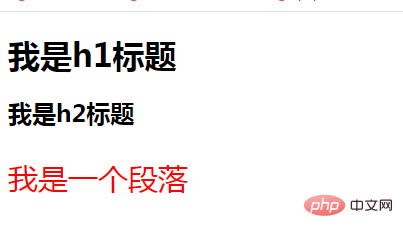What is the inline style of css
In CSS, inline style, also known as inline style, is to directly set the CSS style of the element through the style attribute inside the HTML tag. The syntax "". Inline styles will overwrite the same style effects of other introduction methods; it is difficult for multiple elements to share styles, which is not conducive to code reuse; HTML and CSS codes are mixed, which is not conducive to programmers and search engines.

The operating environment of this tutorial: Windows 7 system, CSS3&&HTML5 version, Dell G3 computer.
Inline style, also known as inline style, is to put the CSS style directly in the tag within the line of code, usually in the style attribute of the tag; that is, it is set directly through the style attribute inside the HTML tag The CSS style of the element. Since inline styles are inserted directly into tags, they are the most direct way, and they are also the least convenient to modify.
Syntax:
<标记 style="样式的属性名1:样式的属性值1;属性名2:属性值2;......"></标记>
For example:
<!DOCTYPE html>
<html>
<head>
<meta charset="utf-8">
<title>第一个网页</title>
</head>
<body>
<h1 id="我是h-标题">我是h1标题</h1>
<h2 id="我是h-标题">我是h2标题</h2>
<p style="color: red;font-size: 30px;">我是一个段落</p>
</body>
</html>
In the above example, the inline style is determined by the style attribute of the HTML element, Just put the CSS code within quotes, and separate multiple CSS property values by semicolons
<p style="max-width:90%">我是一个段落</p>
Advantages of inline styles:
Without the style sheet file, efficiency can be improved at certain times;
The style effect using the style attribute will be the strongest and will be overwritten. Same style effect as other introduction methods.
Disadvantages of inline styles:
- ##It is difficult to share styles with multiple elements, which is not conducive to code reuse;
- HTML and CSS codes are mixed, which is not conducive to reading by programmers and search engines.
- Every tag needs to be styled Add style attribute.
- The difference from the past when web page makers mixed HTML tags and styles together is that inline styles are now written through CSS, and HTML tag attributes were used in the past. Although the methods are different, the style effect is the same: the later maintenance cost is high, that is, when modifying the page, you need to open each page of the website one by one and modify it one by one, and you cannot see the role of CSS at all.
- Adding so many inline styles will make the page large. If the portal is written in this way, it will waste server bandwidth and traffic.
- If the web page author writes such an inline style, he can quickly change the current style without considering the conflict of previously written styles;
- If this situation exists in the web page, When editing in the background, the styles are generated through the editor, or the background is not fully developed. It is necessary to develop options for editors to select styles instead of directly changing the color, thickness, background color, tilt and other effects through the editor.
Getting started with web front-end)
The above is the detailed content of What is the inline style of css. For more information, please follow other related articles on the PHP Chinese website!

Hot AI Tools

Undresser.AI Undress
AI-powered app for creating realistic nude photos

AI Clothes Remover
Online AI tool for removing clothes from photos.

Undress AI Tool
Undress images for free

Clothoff.io
AI clothes remover

Video Face Swap
Swap faces in any video effortlessly with our completely free AI face swap tool!

Hot Article

Hot Tools

Notepad++7.3.1
Easy-to-use and free code editor

SublimeText3 Chinese version
Chinese version, very easy to use

Zend Studio 13.0.1
Powerful PHP integrated development environment

Dreamweaver CS6
Visual web development tools

SublimeText3 Mac version
God-level code editing software (SublimeText3)

Hot Topics
 1387
1387
 52
52
 How to use bootstrap in vue
Apr 07, 2025 pm 11:33 PM
How to use bootstrap in vue
Apr 07, 2025 pm 11:33 PM
Using Bootstrap in Vue.js is divided into five steps: Install Bootstrap. Import Bootstrap in main.js. Use the Bootstrap component directly in the template. Optional: Custom style. Optional: Use plug-ins.
 The Roles of HTML, CSS, and JavaScript: Core Responsibilities
Apr 08, 2025 pm 07:05 PM
The Roles of HTML, CSS, and JavaScript: Core Responsibilities
Apr 08, 2025 pm 07:05 PM
HTML defines the web structure, CSS is responsible for style and layout, and JavaScript gives dynamic interaction. The three perform their duties in web development and jointly build a colorful website.
 How to write split lines on bootstrap
Apr 07, 2025 pm 03:12 PM
How to write split lines on bootstrap
Apr 07, 2025 pm 03:12 PM
There are two ways to create a Bootstrap split line: using the tag, which creates a horizontal split line. Use the CSS border property to create custom style split lines.
 Understanding HTML, CSS, and JavaScript: A Beginner's Guide
Apr 12, 2025 am 12:02 AM
Understanding HTML, CSS, and JavaScript: A Beginner's Guide
Apr 12, 2025 am 12:02 AM
WebdevelopmentreliesonHTML,CSS,andJavaScript:1)HTMLstructurescontent,2)CSSstylesit,and3)JavaScriptaddsinteractivity,formingthebasisofmodernwebexperiences.
 How to resize bootstrap
Apr 07, 2025 pm 03:18 PM
How to resize bootstrap
Apr 07, 2025 pm 03:18 PM
To adjust the size of elements in Bootstrap, you can use the dimension class, which includes: adjusting width: .col-, .w-, .mw-adjust height: .h-, .min-h-, .max-h-
 How to use bootstrap button
Apr 07, 2025 pm 03:09 PM
How to use bootstrap button
Apr 07, 2025 pm 03:09 PM
How to use the Bootstrap button? Introduce Bootstrap CSS to create button elements and add Bootstrap button class to add button text
 How to set up the framework for bootstrap
Apr 07, 2025 pm 03:27 PM
How to set up the framework for bootstrap
Apr 07, 2025 pm 03:27 PM
To set up the Bootstrap framework, you need to follow these steps: 1. Reference the Bootstrap file via CDN; 2. Download and host the file on your own server; 3. Include the Bootstrap file in HTML; 4. Compile Sass/Less as needed; 5. Import a custom file (optional). Once setup is complete, you can use Bootstrap's grid systems, components, and styles to create responsive websites and applications.
 How to insert pictures on bootstrap
Apr 07, 2025 pm 03:30 PM
How to insert pictures on bootstrap
Apr 07, 2025 pm 03:30 PM
There are several ways to insert images in Bootstrap: insert images directly, using the HTML img tag. With the Bootstrap image component, you can provide responsive images and more styles. Set the image size, use the img-fluid class to make the image adaptable. Set the border, using the img-bordered class. Set the rounded corners and use the img-rounded class. Set the shadow, use the shadow class. Resize and position the image, using CSS style. Using the background image, use the background-image CSS property.




